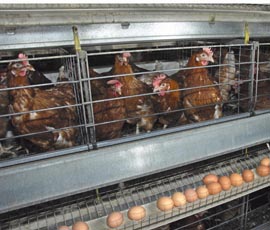Egg industry challenges illegal imports policy

The British Egg Industry Council has taken the first steps towards a legal challenge against the government over its refusal to ban imports of eggs and egg products produced in battery cages.
It has written to DEFRA, asking for a fuller explanation behind its decision taken in early December and demanding it review its current position that the government cannot do anything to prevent the importation of illegally-produced eggs and egg products.
“The BEIC’s legal advice is that the government has incorrectly interpreted the law and it believes the government must not condone the importation of illegal battery cage eggs and egg products into the UK,” said a statement.
DEFRA has 14 days to reply. If the reply is not satisfactory, it is then open to the BEIC to apply to the court for permission to commence legal proceedings.
British egg producers have invested £400m on phasing out barren battery cages to meet the requirements of EU legislation which came into force on 1 January 2012, and all British Lion cage eggs now come from new, enriched colony cages.
However, producers in 13 other EU countries, including Spain, Italy and Poland, have not fully complied with the ban and it is estimated that more than 50 million hens are still being kept in barren battery cages, producing more than 40m eggs a day.
“EU member states have had more than 12 years to get their houses in order and comply with the new legislation, so there are no excuses,” said BEIC chairman Andrew Parker.
“We’re asking the government to conduct proper checks of imported eggs, egg products and products containing eggs entering UK ports, egg packing stations, processing plants, importers and wholesalers. Otherwise, UK consumers could be eating eggs from illegal battery hens and British egg producers will be seriously undermined, with the possible loss of thousands of jobs.”
Although the government has said it will conduct checks of shell egg imports, using UV lights to look for signs of wire floors on the shells, it does not plan to check imported egg products or products containing eggs.
“This is ridiculous,” said Mr Parker. “All that is required is the production of proper supporting documentation with all eggs and egg-related products entering the country, which is already a legal requirement on distributors. This is standard traceability procedure operated throughout the food industry, both here in the UK and in the EU, so it should be a straightforward process for the government to do the right thing, both ethically and legally.”
But DEFRA has defended its position, stating that, given the very significant legal and financial implications, coupled with practical difficulties in enforcing it, introducing an import ban “is not a realistic option”. “To protect consumers from buying eggs from battery cages we have worked closely with the major food processors and retailers who have agreed not to supply these eggs or use them in their own foods,” said a spokesman.
The BEIC has launched a new website and is calling for food companies and the public to sign its pledge to support British egg producers and help keep illegal eggs out of the UK.
